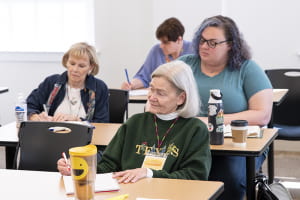Perkins Summit draws attendees from around the nation for Bible study and more
In an impassioned lecture, Angela Gorrell reminded the audience: Joy matters.
Gorrell presented the keynote lecture at the 2022 Perkins Summit for Faith and Learning, Friday and Saturday, March 25-26 at the Dallas campus of Perkins. Some 55 people from nine states attended the annual event, with virtual attendees joining from as far away as Alaska, California and North Carolina. In addition to the Friday night lecture, attendees could choose from a selection of courses on the Bible, theology and spirituality taught by Perkins faculty and Gorrell.
 The event was sponsored by the Howard-Holbert Endowment for Laity Education. Ten attendees were there thanks to a special arrangement with the Arkansas Methodist Foundation, which paid for tuition, travel and accommodations for clergy and staff in the Arkansas Conference of The United Methodist Church. The Foundation also supports Arkansas conference members attending other programs hosted by the Perkins Office of External Programs throughout the year.
The event was sponsored by the Howard-Holbert Endowment for Laity Education. Ten attendees were there thanks to a special arrangement with the Arkansas Methodist Foundation, which paid for tuition, travel and accommodations for clergy and staff in the Arkansas Conference of The United Methodist Church. The Foundation also supports Arkansas conference members attending other programs hosted by the Perkins Office of External Programs throughout the year.
Gorrell is the author of The Gravity of Joy: A Story of Being Lost and Found and assistant professor of Practical Theology at Baylor University’s George W. Truett Theological Seminary. She shared the story of her journey that culminated in her book. Eight months after she began working as an associate research scholar at Yale on the Theology of Joy and the Good Life Project, Gorrell lost three family members within the space of four weeks. One committed suicide at age 30; a nephew died of cardiac arrest at age 22, due to an undiagnosed heart condition; and her father died of organ failure related to opioid addiction.
“In the time that followed, I struggled to find meaning in my work,” she said. “I felt a deep, overwhelming sense of powerless. Suddenly, the word ‘joy’ made me cringe. Life was not joyful.”
Shortly after the three family members died, Gorrell traveled to Grenada, an island in the Caribbean, to get away. Arriving the first night, exhausted, she went to bed in her hotel room — but couldn’t sleep. A buzzing noise outside her room kept her awake. She called the front desk, and a hotel staff member came to check. The staff member quickly identified the problem.
“Those are crickets,” she said. “I can’t turn those down.”
Crickets have special significance for Gorrell. Born deaf, without bones in her middle ear, her parents found a doctor to perform a new surgery to implant prosthetic bones when she was a young child. The doctor warned that the surgery might not work. It would take time before the outcome would be known; he couldn’t guarantee the results.
After surgery, her parents loaded her into their car for the long drive home. And on the way, she suddenly asked her parents: “What’s the buzzing?”
“My parents realized I had never heard crickets before, and now I was able to hear,” Gorrell said.
That night in Grenada, Gorrell felt God’s presence in a way she had not felt since her father’s death.
“I felt his smile from that night so many years ago,” she said. “I remembered how he would tell that story with such delight. That was the moment when my parents realized that crickets were just the beginning of the world I had yet to discover. That night, I could remember the man who had lived and loved big, before he was in the grip of addiction. What had felt broken felt repaired. It was a redemptive, restorative joy.”
A turning point came 18 months later. After many tears and therapy sessions, Gorrell was invited to co-lead a Bible study at a women’s maximum-security prison. All of the women had mental health issues; all were in prison due to addictions to heroin or crack cocaine. Yet, they found a way to experience joy when the group sang together, “as if the music was revival for the dead parts of our souls.” One evening, they sang so loudly that one of the correction officers came into the room, expecting trouble.
 “Our ashes became crowns of beauty,” Gorrell said. “Our spirits of despair became praise. From these women, I realized joy was not trivial. Joy is vital — for me, for you, for these women. Joy matters!”
“Our ashes became crowns of beauty,” Gorrell said. “Our spirits of despair became praise. From these women, I realized joy was not trivial. Joy is vital — for me, for you, for these women. Joy matters!”
Churches can become spaces where people can experience joy, Gorrell added.
“We can design physical spaces for joy,” she said. “Churches might set up a Joy Wall — a place where people can use spray paint or markers, to write their joys, to draw lines to connect similar things that others experience. It can become an interactive, dynamic conversation.”
By giving people permission to experience emotions — sorrow, anger, despair as well as joy — churches can create space where joy happens.
“We cannot make joy,” she said. “The feeling is a gift. But we can choose to rejoice. We either live exposed or we live numb, which is not at all. We can choose to live with open hands. We can live awake.”
